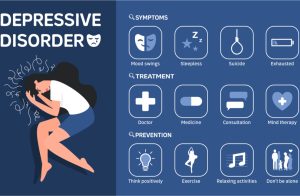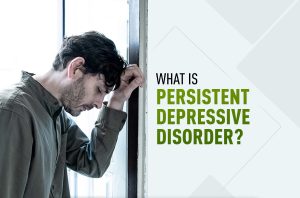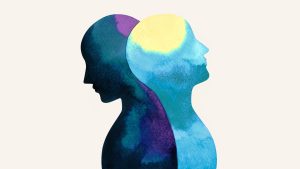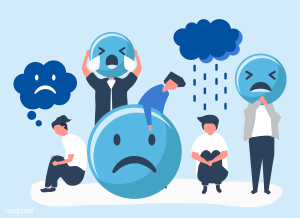Depression is a mental illness that affects millions of people every year. It can cause feelings of sadness, hopelessness, and worthlessness that can last for weeks or months at a time. If you are feeling depressed, it is important to get help. In this blog post, we will discuss the symptoms of depression, how to deal with it, and where to find help.
Contents
- 1 What Is Depression?
- 2 Types Of Depression
- 3 Symptoms of Depression
- 4 Causes Of Depression
- 5 What Is Smiling Depression?
- 6 Why Depression Is Dangerous?
- 7 Risks Factors Of Depression
- 8 How Is Depression Diagnosed?
- 9 Treatment Options For Depression
- 10
- 11 Connection Between Depression And Suicide
- 12 Helping Someone Suffering From Depression
- 13 Conclusion
- 14 A Word From Therapy Mantra
What Is Depression?
Depression is a mental illness that affects how you think, feel, and act. It can lead to a range of negative emotions and behaviors, such as feeling sad or down most of the time, feeling hopeless or helpless, having no interest in activities you used to enjoy, withdrawing from friends and family, experiencing changes in appetite or weight, and having difficulty concentrating or making decisions. It can also cause physical problems such as headaches, pain syndromes, trouble sleeping, and fatigue.
Depression ranges in severity from mild to severe. A person with this may only have symptoms occasionally or for a short period of time. A person may have symptoms nearly every day and find it difficult to carry out everyday tasks.
Types Of Depression
There are several types of depression, including major depressive disorder, persistent depressive disorder (dysthymia), bipolar disorder, and seasonal affective disorder.
Major Depressive Disorder
Major depressive disorder is a type of depression that lasts for at least two weeks and causes significant distress or impairment in functioning. A person with the major depressive disorder may have symptoms such as persistent sadness, feelings of worthlessness or guilt, loss of interest in activities, fatigue, problems concentrating, sleep disturbances, and thoughts of death or suicide.
Persistent Depressive Disorder
Persistent depressive disorder (dysthymia) is a type of depression that lasts for at least two years and causes significant distress or impairment in functioning. A person with dysthymia may have symptoms such as low energy, poor appetite or weight gain, trouble sleeping, feeling hopeless or helpless, and having difficulty concentrating.
Bipolar Disorder
Bipolar disorder is a type of depression that causes extreme mood swings, from feeling very high and happy to feeling very low and sad. Therefore, a person with bipolar disorder may have symptoms such as grandiose delusions (thinking they are better than others), increased energy, decreased need for sleep, Racing thoughts, irritability, aggressive behavior, and feelings of despair.
Seasonal Affective Disorder
Seasonal affective disorder (SAD) is a type of depression that occurs during certain seasons, usually wintertime. A person with SAD may have symptoms such as fatigue, low energy, problems concentrating, changes in appetite or weight, sleeping too much or too little, and feelings of hopelessness or sadness.
Symptoms of Depression
The symptoms of depression vary from person to person, but there are common symptoms such as:
- Fatigue
- Decreased energy
- Feelings of worthlessness or guilt
- Problems concentrating
- Changes in appetite or weight
- Sleep disturbances
- Thoughts of death or suicide
Causes Of Depression
The causes of depression are not fully understood, but it is thought to be caused by a combination of genetic, biological, environmental, and psychological factors.
- Genetic Causes Of Depression: It can run in families, and research suggests that there is a genetic component to the illness. This means that people with a family history of depression are more likely to develop the disorder themselves.
- Biological Causes Of Depression: Depression may be caused by changes in brain chemistry. Serotonin, norepinephrine, and dopamine are some of the chemicals in the brain that plays a role in mood. It is thought that depression may be caused by low levels of these chemicals or by problems with how they work together.
- Environmental Causes Of Depression: Environmental factors such as stress, traumatic life events, poverty, and abuse can also contribute to developing depression.
- Psychological Causes Of Depression: Psychological factors such as low self-esteem, perfectionism, and stress can also contribute to developing depression.
What Is Smiling Depression?
Smiling depression is a type of depression that often goes undetected. This is because the person seems to be happy and content on the surface. A person with this may have symptoms such as fatigue, low energy, problems concentrating, changes in appetite or weight, sleeping too much or too little, and feelings of hopelessness or sadness.
Why Depression Is Dangerous?
Depression is a serious illness that can be life-threatening. It is the leading cause of disability worldwide, and it can cause problems in every area of a person’s life. Depression can make it difficult to work, go to school, take care of oneself, and interact with others. It can also lead to physical health problems such as heart disease, diabetes, and obesity.
Risks Factors Of Depression
There are many risks factors for this, including genetic, biological, environmental, and psychological factors. Such as:
- Having a history of mental illness or addiction
- Being female (women are more likely to experience depression than men)
- Being age 65 or older
- Living in poverty
- Experiencing traumatic life events such as abuse or violence
- Using drugs or alcohol
How Is Depression Diagnosed?
There is no one test to diagnose depression, but a doctor will typically ask about a person’s symptoms and medical history. The doctor may also do a physical exam and order lab tests to rule out other possible causes of the symptoms.
Treatment Options For Depression
Treating depression is very important. Some of these treatment options are:
Therapy
There are many different types of therapy for this, such as cognitive-behavioral therapy (CBT), interpersonal therapy, and psychodynamic therapy. Therapy can help a person understand the thoughts and emotions that contribute to their depression and learn coping skills to manage their symptoms.
- Cognitive Behavioral Therapy: Cognitive-behavioral therapy is a type of therapy that focuses on the thoughts and emotions that contribute to depression. A therapist will help you with your negative thoughts about yourself and the world. They will work to replace them with more positive thoughts.
- Interpersonal Therapy: Interpersonal therapy is a type of therapy that focuses on the relationships a person has with others. The therapist will help the person identify problems in their relationships, such as conflict or communication difficulties, and learn better ways to interact with others.
- Psychodynamic Therapy: Psychodynamic therapy is a type of therapy that focuses on the unconscious mind. The therapist will help the person explore unresolved conflicts from childhood or past relationships that may be contributing to their depression.
Medication 
There are many different types of medication for depression, such as:
- Antidepressants: SSRIs, SNRIs, TCAs, MAOIs
- Stimulants: methylphenidate (e.g., Ritalin), amphetamine (e.g., Adderall)
- Antipsychotics: clozapine (Clozaril), olanzapine (Zyprexa), quetiapine (Seroquel), risperidone (Risperdal)
- Benzodiazepines: diazepam (Valium), lorazepam (Ativan)
- Mood stabilizers: lithium (Lithobid, Eskalith), valproic acid (Depakote)
- Atypical Antipsychotic: An atypical antipsychotic is a type of medication that is used to treat psychotic symptoms such as delusions or hallucinations. It is also used to treat mood disorders such as bipolar disorder and schizophrenia. Olanzapine (Zyprexa), quetiapine (Seroquel), and risperidone (Risperdal) are some of the most commonly prescribed atypical antipsychotics.
Side Effects Of Antidepressants: The most common side effects of antidepressants include nausea, vomiting, diarrhea, weight gain, sexual problems, and dry mouth. Some antidepressants may also increase the risk of suicidal thoughts or behavior in some people.
Side Effects Of Antipsychotics: The most common side effects of antipsychotics include weight gain, sedation, dizziness, and dry mouth. Some antipsychotics may also increase the risk of heart disease and diabetes.
Connection Between Depression And Suicide
Depression is the leading cause of suicide. Suicide is a serious problem and it is important to get help, therefore if you are feeling suicidal. If you are in danger of harming yourself, please call or go to the nearest emergency room.
Warning Signs Of Suicide
There are many warning signs of suicide such as:
- Talking about wanting to die or hurt oneself
- Expressing feelings of hopelessness
- Talking about being a burden to others
- Increasing alcohol or drug abuse
- Withdrawing from friends and activities
- Abnormal mood swings
- Giving away prized possessions
If you notice any of these warning signs in someone that you know, please get help immediately.
Helping Someone Suffering From Depression
If someone from your family or any friend is suffering from this, you can help them. Here are a few things mentioned below for your help, such as:
- If you know someone who is suffering from this, the best thing you can do is to be there for them.
- Let them know that you care and that you are there to support them.
- You can also offer practical help, such as taking them to appointments or helping with grocery shopping and household tasks.
- If the person seems suicidal, it is important to get help immediately. Call a therapist or go to the nearest emergency room.
- Therapy can help a person understand the thoughts and emotions that contribute to their depression and learn coping skills to manage their symptoms.
Conclusion
There are many things that can make a person feel depressed. No one is immune to feeling down from time to time, but there’s no reason why you should have to suffer through it alone. However, you deserve help and support if you’re dealing with depression or an anxiety disorder. We all do! If this sounds like something you need right now, please reach out for help on the National Suicide Prevention Lifeline.
A Word From Therapy Mantra
Your mental health — Your psychological, emotional, and social well-being — has an impact on every aspect of your life. Positive mental health essentially allows you to effectively deal with life’s everyday challenges.
At TherapyMantra, we have a team of therapists who provide affordable online therapy to assist you with issues such as depression, anxiety, stress, workplace Issues, addiction, relationship, OCD, LGBTQ, and PTSD. You can book a free therapy or download our free Android or iOS app.












